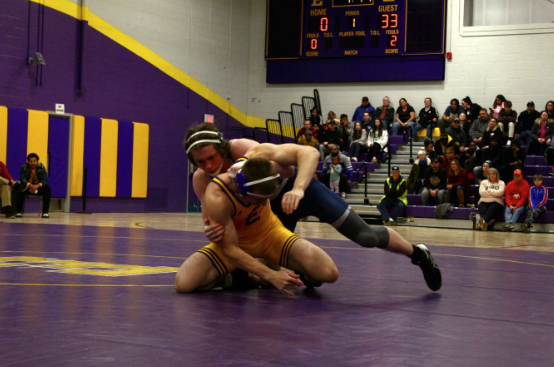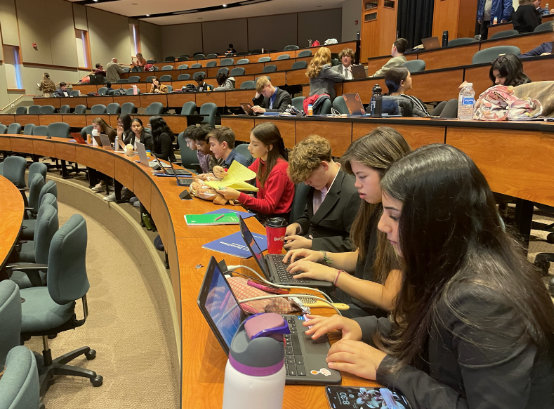When I was younger, my dad would always ask me: “You aren’t a quitter, are you?”
At that time, I liked to believe that I was no quitter, and I could pull through anything. However, looking back on all of the sports I’ve done over the years, it appears that I am, in fact, a quitter. From gymnastics to soccer, soccer to cheerleading, and cheerleading to volleyball, my outcome had been the same for all of them. I no longer participate. All of them left me going home feeling exhausted, excluded and disregarded.
However, looking around it appears that I am not the only one. High school sports today take competition to the next level, a much higher level than in past years. This forces teenagers to up their competitiveness or be shunned for not fully dedicating all of their time to the team and working towards a victory. In reality, some teens really just do not have the time and must set aside their love of sport for other responsibilities. These could be family obligations, work, hobbies, or other clubs and sports.

One such student, Gavin Lavery, a junior at McDowell High School, participated in wrestling for nine years. Unfortunately, he had left the mat this year.
Lavery said he quit last season due to financial reasons such as paying bills and other monetary responsibilities. Although, he says that if he had the time, he never would have quit.
Ambitious high school students don’t have much time to set aside for themselves. They have to balance school work with part time jobs and somehow have to squeeze sports into their schedules, too. It is exhausting to constantly strive to meet outside expectations, but teenagers cannot choose to quit their jobs nor can they stop going to school. So, they tend to give up sports – something that actually could help relieve some of the stress of those jobs and schoolwork.

For some students “sports” take the form of academic-related teams such as the Speech & Debate Team. My participation on this team over the last two years has unfortunately had the same effect on myself, though. This season, I have found it incredibly difficult to find the time and motivation to fully dedicate myself to my team and event. Although I’d tried the best I could, I couldn’t help but feel as though both my teammates and coach were disappointed in me.
Once in high school, sports and academic teams aren’t flexible towards teenager’s responsibilities and schedules. Team members have to compete for their spot to stay on the team, and if you miss practice, competitions or games, you might as well just cozy up on the bench for the rest of the season.
There is a point where athletes do give up. They try the best they can to stick with it for as long as they can, but there is no longer anything left for them to enjoy. When an athlete finally realizes that, they leave. Hopefully they go on to do bigger and better things but in my experience, I will always long to play the sport I used to love.
Surprisingly, volleyball was the only sport I would be excited to go to practice for. This was a major shift from soccer or cheerleading, where I had to drag my feet and convince myself I actually liked going. I wanted to be the very best I could. I wanted to stand out in the spotlight of the court. Most of all, I wanted to be someone that my teammates and coach could depend on.
Feeling out of place in a sport is the worst feeling in the world. Kids may love the sport and enjoy playing it, but it can get lonely without anyone to call a friend. It is much harder to make friends in high school than in younger years, when you could bond over your favorite TV show or toys.
While I tried to get involved the best I could, nothing could really change how my teammates felt about me though. This is an experience that, sadly, many other kids go through when it comes to clubs and activities.
For Lavery and some of his teammates, a change in coaching staff turned them away from their sport.
Even if a coach only wants the best for his/her team, sometimes they may come off as unapproachable, unfair, or mean.
While it’s hard to say that everyone should be included in sports no matter how good or bad they are, I know it is important for a team to be the best they can. Working towards improvement is something that every athlete should do.
However, if a player is at the best level they can be at and they are still being kept from playing, then that player becomes discouraged and worn out every time they show up. This is a classic example of favoritism that many coaches, both athletic and academic, sadly use.
Just like me, these students may think of themselves as quitters, but in retrospect, quitting something is not a bad thing if it is what is best for you and your mental and physical health.
Still, It is heartbreaking to see a student quit an activity that they really do love, especially if they dedicated years of their life to it. It is especially heartbreaking to that person as well. Lavery stated that he hated not doing his sport anymore.
“It was a great sport, I love doing it, but it was just a decision that I had to do so I could actually go somewhere, because sports aren’t everything, but they were everything at the time,” he said.
Although some teenagers get over it and realize what is best for them, some will still long for that experience, and that is perfectly normal. On the flip side, some may never want to look back, and that is okay too. No matter what a person’s experience is like, something can always be taken from an experience like this. Quitting does not always mean giving up. For some, it means a new beginning.